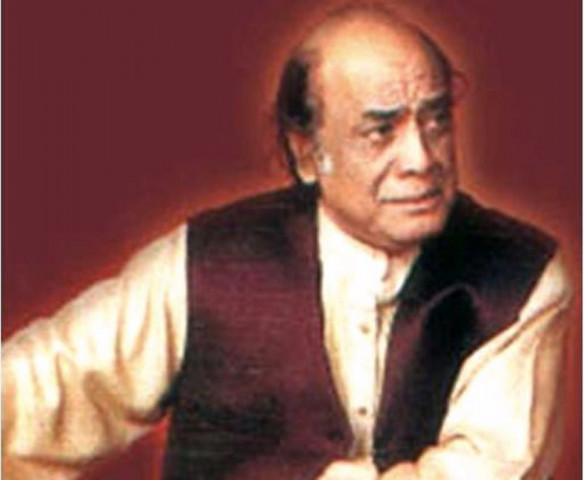Possessor of the gift of suchha sur
Now that he is gone, let us remember him for his work and great contribution to music.

Possessor of the gift of suchha sur
It was symbolic. I received the news of his death sitting in my darkened study waiting for the light (electricity) to come. It did come, after the usual doze of load shedding. But what about the utter darkness in which he has left his fans – ardent lovers of ghazal and genuine music – for whom it is difficult to come to terms with his passing away.
Surely, the wait is going to be long, very long - since one is not sure how many centuries it is going to take before another singer of his class and stature arrives on the scene.
But one has a strange sense of relief too. He has been mercifully called by his Creator– at last. For more than a decade, and for many of his admirers, it was heart wrenching to see him suffering not only physical incapacity but mental torture too, silently, helplessly, even humiliatingly, for his illness seemed to have brought a kind of windfall for some people. As I knew Mehdi Hasan, he was a self-respecting man who would not approve of being presented as a destitute artist in need of financial support from moneyed individuals and government functionaries.
Now that he is gone, let us remember him for his work and great contribution to music.
Born in a village called Luna near Jaipur, Rajasthan, Mehdi Hasan at age six started to receive his classical music training from his uncle Ismail Khan. Later, he was groomed by his elder brother Ghulam Qadir, (who composed such remarkable ghazals for him as: daayem para hua tere dar per naheen hoon main in raag Kaushak Dhani, Uzr aane mein bhi hai aur bulatey bhi naheen in raag Partabvarali and Mohabbat karne waley kum na hon ge in raag Khammaj). His maternal uncle, Ustad Nihal Abdullah too created a remarkable composition of Aziz Hamid Madni’s famous ghazal for him: Taza hawa bahar ki dil ka malal le gai in raag Jai Jai Wanti.
Quite proficient in classical music himself, Mehdi Hasan composed most of his ghazals in raags as varied as Basant Mukhari, Aheer Tori, Jhinjhoti, Charukeshi, Patdeep, Kirwani, Shudh Sarang etc.
No one before him (Begum Akhtar, Talat Mahmood, K.L. Saigal), or among his contemporaries (Farida Khanum, Iqbal Bano, Ghulam Ali) have rendered ghazals of the great masters – Ghalib, Mir Taqi Mir, Dagh, Momin, Bahadur Shah Zafar, Hasrat Mohani, with such finesse and authority as Mehdi Hasan. He also composed and recorded many ghazals of contemporary poets such as: Faiz, Faraz, Hafeez Jallundhari, Jigar, Arzoo, Shaer Lucknawai, Nasir Kazmi, Adeeb Saharanpuri, Seemab Akbarabadi, Tabish Dehlavi, Perween Shakir, Khatir Ghaznavi, Qateel, Adam, Ahsan Danish, etc., in different raags.
Throughout classical music history we have seen that the gift of suchha sur was bestowed upon only a few fortunate ones by Nature. Mehdi Hasan had been blessed with this gift in abundance. I recall, many years ago, I and my friend Latif Kapadia had gone to see Naushad Sahab, the legendary Indian music director in Mumbai. After having a chat with him when we stood up to take his leave, he asked us to stay for dinner, “Aap ruk jaen, aaj ka din bara special hai. Main ne Mehdi Hasan Sahab ko khaney per bulaya hai.”
“What do you think of his singing?” I asked foolishly.
“I can’t find suitable words to explain the purity and greatness of his art. Unki tareef sooraj ko chiragh dekhana hai.” Said the great man – of another great man.
Published in The Express Tribune, June 14th, 2012.


















COMMENTS
Comments are moderated and generally will be posted if they are on-topic and not abusive.
For more information, please see our Comments FAQ